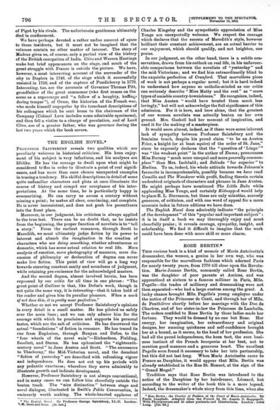THE ENGLISH NOVEL.*
PROFESSOR SAINTSB1JRY reveals two qualities which are peculiarly welcome in historical criticism. His keen enjoy- ment of his subject is very infectious, and his analyses are lifelike. He has the courage to dwell upon what might be considered trifles in order to illustrate a point of real signifi- cance, and has more than once chosen unexpected examples in tracing a tendency. His skilful descriptions in detail of some quite unfamiliar characters and plots at once illuminate the course of history and compel our acceptance of his inter- pretations. At the same time, he is particularly happy in summarizing. He can carry us across a century without missing a point; he makes all clear, convincing, and complete. He is never inconsistent, and does not push his parentheses into the front place.
Moreover, in our judgment, his criticism is always applied to the true test. There can be no doubt that, as he insists from the beginning, the proper function of novelists is to "tell a story." From the earliest romances, through Scott to Meredith, we must ultimately judge fiction by its power to interest and absorb the imagination in the creation of characters who are doing something, whether adventurous or domestic, which has some actual relation to real life. Mere analysis of emotion, mere photography of manners, mere dis- cussion of philosophy or declaration of dogma can never make live fiction. This point of view will go a long way towards ensuring constant sanity and soundness of judgment, while retaining pre-eminence for the acknowledged masters.
And the second dogma, almost involved herein, has been expressed by our critic for all time in one phrase : " The great point of Gulliver is that, like Defoe's work, though in not quite the same way, it is interesting—that it takes hold of the reader and gives him its peculiar pleasure. When a work of art does this, it is pretty near perfection."
Whether or not we accept Professor Saintsbury's opinions in every detail is a small matter. He has piloted us safely over the main lines ; and we can only admire him for the courage with which he proclaims and supports his personal tastes, which are the salt of criticism. He has discovered the actual "foundations" of fiction in romance. He has traced its rise from Euphuism, through Bunyan and Defoe, to the "four wheels of the novel wain"—Richardson, Fielding, Smollett, and Sterne. He has epitomized the "eighteenth- century novel " to Jane Austen and Scott. " The successors to Thackeray," the Mid-Victorian novel, and the decadent " fiction of yesterday " are described with refreshing vigour and independence. He does not cut up his periods with any pedantic exactness ; wherefore they serve admirably to illustrate growth and indicate development.
However, Professor Saintsbury is not always conventional, and in many cases we can follow him cheerfully outside the beaten track. The "nice distinction" between stage and novel dialogue, illustrated in Swift's Polite Conversation, is eminently worth making. The whole-hearted applause of
• The English. Novel. By Professor George Saintabury, LL.D. London: T. M. Dent and Sons. L. net.]
Charles Kingsley and the sympathetic appreciation of Miss Yonge are unexpectedly welcome. We respect the courage which declares that the secrete of Meredith's style, however brilliant their constant achievement, are an actual barrier to our enjoyment, which should qualify, and not heighten, our praise.
In our judgment, on the other hand, there is a subtle con- servatism, drawn from his outlook on real life, in his unfavour- able comparisons between the novelists of "yesterday" and the mid-Victorians ; and we find him extraordinarily blind to the exquisite perfection of Cranford. That marvellous piece of work is not perhaps a regular novel; but it is hard indeed to understand how anyone so catholic-minded as our critics can seriously describe " Miss Matty and the rest" as " mere types of amiable country-townishness." He recognizes, indeed, that Miss Austen " would have treated them much less lovingly," but will not acknowledge the full significance of this admission. For it is here, and here alone, that the greatest of our women novelists was actually beaten on her own ground. Mrs. Gaskell had her moment of inspiration, and used it for the making of a masterpiece.
It would seem almost, indeed, as if there were some inherent lack of sympathy between Professor Saintsbury and the feminine touch, despite his proud claim " to be an Austen Friar, a knight (or at least squire) of the order of St. Jane," since he expressly declares that the " question of ' Lingo' " was " the weakest point " in the author of Emma; pronounces Miss Burney " much more unequal and more generally common- place" than Mrs. Inchbald; and Belinda " far superior " to Evelina. To us, indeed, his whole attitude towards Johnson's favourite is incomprehensible, possibly because we have read Camilla and The Wanderer with profit, finding therein certain undoubted originals of characters and phrases in Jane Austen. He might perhaps have mentioned The Little Duke while applauding Miss Yonge, and certainly Kidnapped would help to place R. L. Stevenson, but these are only minutiae, scarcely generous, of criticism, and with one word of appeal for a more accurate index in future editions we have done.
The English Novel does admirably indicate " the principle of the development " of this "popular and important subject" : it is in itself a book we may thoroughly enjoy and must cheerfully praise ; it reveals courage, sympathy, insight, and scholarship. We find it difficult to imagine that the work could have been done with more skill or more charm.






























































 Previous page
Previous page